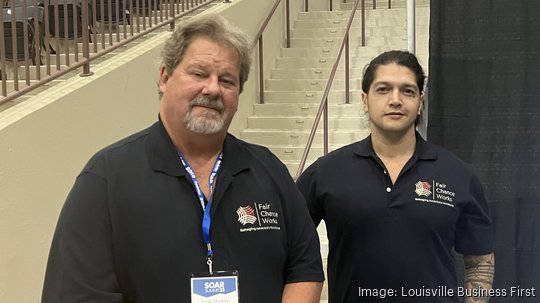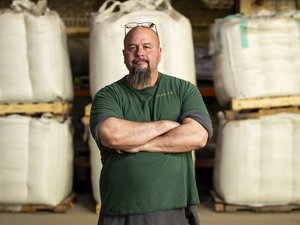
Second-chance employment. It’s one of the big topics of conversations in all corners of the commonwealth.
It has been well documented that Kentucky, which has the seventh lowest labor participation in the U.S., has an employment gap when it comes to workers, particularly men in their prime-age years (25 to 54). This is also the largest employment gap across the country, which is at a historic low.
That gap constitutes roughly 35,000 men in the commonwealth in that demographic alone, as discussed during a panel at the latest Shaping Our Appalachian Region (SOAR) Summit that I attended in Corbin, Kentucky, back in October.
While at the SOAR Summit, I met the leadership team of one London, Kentucky-based startup, Fair Chance Works, that has a mission to help improve those statistics within the commonwealth by creating a video-based hiring platform to help link possible second-chance workers with employers.
“The folks we have been working with for the most part have been just out of society for so long that their soft skills are next to none,” said Fair Chance Works Founder and President Scott Stuckey. “Their self-esteem is really low, and what we’re trying to do is improve their soft skills and improve their interview skills to the extent where they have a chance … of getting a job.”
Stuckey formed the organization in 2021, after moving to Kentucky from Kingsport, Tennessee, in 2016. His initial goal was to develop a screencast technology to be used in the school system to help students and teachers who were based in rural communities create video content. The initial funding came through a $600,000 grant by the U.S. Department of Agriculture in 2018.
When Covid hit, though, it put a major strain on the commercial viability of the product in the education market. Stuckey quickly pivoted to the second-chance jobseekers space after being connected to the Southeast Kentucky Economic Development Corporation (SKED).
Stuckey used a now-patented technology — known as an automated personalized feedback module — to help provide feedback to potential fair or second chance jobseekers.
How it works
In a professionally produced environment, an applicant will sit in front of a camera and answer approximately 10 questions that ask about his or her background. A recording is then made of the videos.
Shortly thereafter, the applicant receives voiceover feedback of what he or she did well and what he or she needs to improve. That process continues until the applicant has a video that is of high enough quality that it can be handed to a prospective employer.
“The idea is to reduce some of the stigma for the employers, because they’re seeing a real person talk about where they’re at and how they can be a good employee,” Stuckey said.
Since I first spoke with Stuckey and FCW’s COO, Chris Lipscomb, the company has been focusing its attention on forming a nonprofit as it attempts to apply for various forms of federal funding including that from the National Institutes of Health and the National Science Foundation. Last week, Fair Chance was approved for a $50,000 recoverable grant at 2% interest over six years by the Appalachian Impact Fund as part of the Foundation for Appalachian Kentucky.
Still, Fair Chance Works continues to seek out capital to build out and scale the technology connected to the patent hiring platform. Stuckey said that if the technology is commercialized, it could extend beyond its current arena “to encompass a much larger slice of the general workforce.” On that front, Fair Chance’s main investor has been Keyhorse Capital.
The company has raised a total of $150,000 to date with the aim of reaching $1 million.
Until then, FCW remains committed to the cause of assisting recovery workers by working with numerous addiction recovery centers and prisons across the state — to get second-chance jobseekers gainful employment while cutting down the rate of drug-related recidivism. Nearly half of the inmates in Kentucky have been previously incarcerated, Libscomb said.
According to information from the Kentucky Department of Corrections, the average cost to incarcerate in the commonwealth ranges from a little less than $30,000 to more than $72,000 a year.
“Our company seeks to provide a business solution in the form of a web-based platform to the issue of socio-economic distress caused by incarceration and substance use disorder in order to help ease the issue of an ongoing labor shortage,” Lipscomb said via email. “If we can succeed in our efforts, taxpayers save their money, the incarcerated or addiction-afflicted rise from their fall, and Kentucky wins.”










